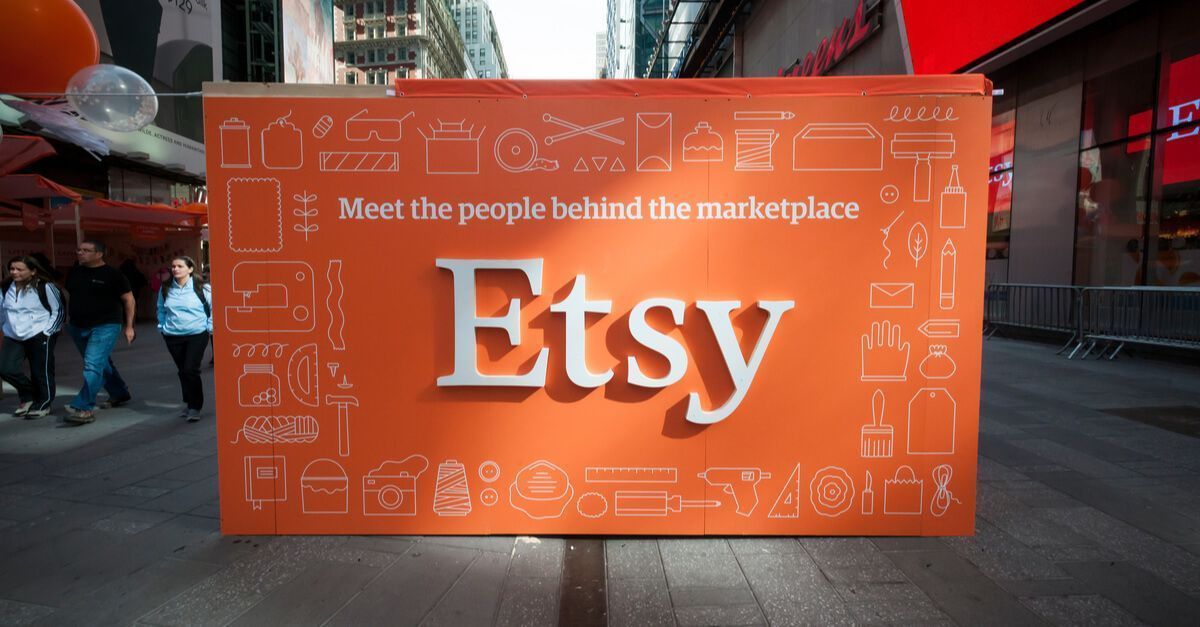Etsy Faces Sec230 Challenge On Counterfeit Cashmere Goods
UPDATE 3-30-23
Seller concerns about what Etsy's settlement with the Cashmere and Camel Hair Manufacturers Institute could mean for them have been realized as the marketplace cracks down on cashmere listings.

So, today, I received what appears to be a general email regarding items containing cashmere or listing cashmere as an element in the design.
I was perplexed as to how this applied to me because I do not carry anything made with Cashmere.
Then the light bulb went off! Aha! I have a candle scent called "Duxbury Cashmere". A candle scent! Yikes! It doesn't contain cashmere Etsy! But I guess they just did a search for the word and sent out the emails.
We also received this email today. We have 3 cotton fabrics which use the color name "cashmere" (light beige) or "cashmere blue" (Pantone 14-4115 TCX). These cotton quilting fabrics have nothing to do with cashmere other than the color name which was assigned by the fabric manufacturers. Are we now reduced to using a common color name (blue, beige, white, etc.) which does not describe the fabric color? Sheesh!
I too received this because I have some hand dyed yarn that is a mix of cashmere and merino. Because it is true cashmere I'm going to wait it out because it's a true listing. I see from other threads that they are just warning shops that are counterfeiting cashmere but sent out emails to all shops with cashmere in their titles, tags, descriptions, whatever.
Have you received a warning from Etsy about using the word "cashmere" in your listings? Let us know in the comments below!
UPDATE 2-8-23
The Cashmere and Camel Hair Manufacturers Institute (CCMI) has announced they have resolved their dispute against Etsy and the case they had brought will not be moving forward.
The Cashmere and Camel Hair Manufacturers Institute (“CCMI”) announced today that its false advertising and unfair competition action in the U.S. District Court for the District of Massachusetts, entitled CCMI v. Etsy, Inc., Case No. 1:22-cv-12242-RWZ, has been finally resolved, avoiding the need for further proceedings in the case.
CCMI’s legal action...had challenged the advertising and sale of purported “100% Cashmere” and “Cashmere” garments on Etsy websites in the U.S. and abroad that CCMI had tested and found not to be Cashmere, but rather to be 100% acrylic, polyester, and other synthetic blends.
Fabio Garzena, President of CCMI, said that “CCMI and Etsy have resolved their dispute and look forward to collaborating to protect the interests of Cashmere customers, manufacturers, and sellers.” CCMI has a long history of working to help maintain the integrity of the Cashmere marketplace by providing important information about Cashmere’s value as a high quality luxury fabric, identifying reliable Cashmere testing laboratories and services, and pursuing legal action where appropriate to challenge the mislabeling of purported Cashmere garments and fabric.
While the press release does not give any details about the terms of the resolution, it's a good bet it will include increased enforcement activities on the platform.
Sellers in the Etsy community are discussing the case, with some fearing it will lead to Etsy deploying automated bots that don't exactly have a great track record of getting it right when it comes to correctly identifying listing violations without false positives.

I think it's most likely etsy will win, however, if it puts a whatsit up their posterior to close down resellers, and counterfeits, then at least that is a plus
just listing on etsy, is advertising, so stopping offsite ads would not make a difference
.... expect a lot of shops here now being "botted" for "Cashmere"
This company may be overstepping. Next AI will target the word Cashmere wool. Knitters know it's the softest wool available and if we can't 'search' for it...blah! And gosh...a lot of bone beads are from Camels. I digress. what's next...Angora Wool, Alpaca etc...will those eventually also not be allowed because it can't be verified? ugh...
Should online 3rd party marketplaces be held liable for fraud and counterfeit goods sold on their sites?
Historically marketplaces have been shielded from liability by Section 230 of the Communications Decency Act but that precedent is increasingly being challenged as legislators and regulators seek new solutions to consumer protection issues.
Etsy is currently facing once such challenge in Massachusetts after international trade group Cashmere and Camel Hair Manufacturers Institute (CCMI) filed a lawsuit involving fake cashmere goods sold by third parties through the marketplace.
CCMI claims Etsy violated the Lanham Act; Massachusetts’ false advertising law; common law prohibitions on unfair competition; and Massachusetts’ Anti-Dilution Statute. They've also brought a novel civil claim alleging that Etsy conspired with the fake cashmere suppliers by virtue of featuring shops with counterfeit wares and financially benefiting from the sales in the way of fees.

In its suit, CCMI seeks to protect the market interest and reputation of its membership against products falsely advertised and marketed as “100% Cashmere” or “Cashmere” when they are made from “cheaper synthetic or man-made materials.” CCMI alleged Etsy’s website, ads, and automated consumer marketing emails sometimes feature shops selling counterfeit cashmere products, implicating the website in the scheme. CCMI also argued that Etsy failed to regulate these false claims, and instead profited from the counterfeit products via fees charged to sellers.
To succeed, CCMI must overcome considerable precedent favoring Etsy under the Communications Decency Act Section 230 — relied on by courts nationwide — which does not consider an “interactive computer service” like Etsy as the publisher or responsible for third-party information on its platform.
Not surprisingly, Etsy relied on Section 230 when answering CCMI’s motion for a temporary restraining order and preliminary injunction, contending it is not responsible or liable for its sellers’ postings, and its terms of use do not warrant the products offered by third-party sellers.
Instead, Etsy maintained its platform merely provides a forum for sellers to operate their own shops, and it cannot “pre-screen” the 100+ million platform listings. Etsy also argued that it neither took possession of any sales items nor materially contributed to the product listings, further insulating it from liability.
Etsy just announced today that Colin Stretch will join the company as Chief Legal Officer effective February 14.

Stretch was previously General Counsel at Meta and has extensive experience in compliance, litigation, public policy, & regulatory issues, so it will be interesting to see how he handles this challenge.
There is much debate over Section 230 and whether or not its provisions from 1996 need to be updated for the modern online world and any decision about Section 230's future will reach far and wide into the internet, not just ecommerce.
Another approach instead of making marketplaces liable directly for the actions of third party sellers is to make them responsible for strictly vetting and verifying those sellers, which is the path Congress has taken in the recently passed INFORM Consumers Act.
The INFORM Act requires marketplaces to verify and in some cases disclose to consumers the contact information for "high volume" sellers on their platforms as well as provide reporting mechanisms for consumers to report suspected fraud, counterfeits, or other unfair or deceptive business practices.

Do you believe marketplaces should be held liable for fraud and the sale of counterfeit goods perpetrated by 3rd party sellers on their platforms? Let us know in the comments below!


















